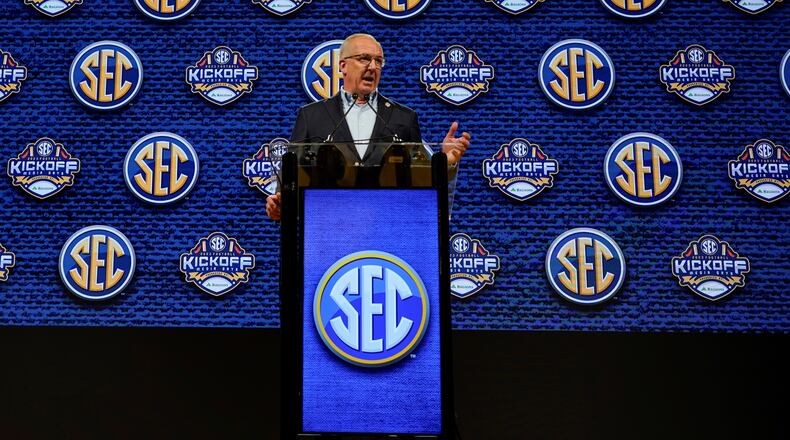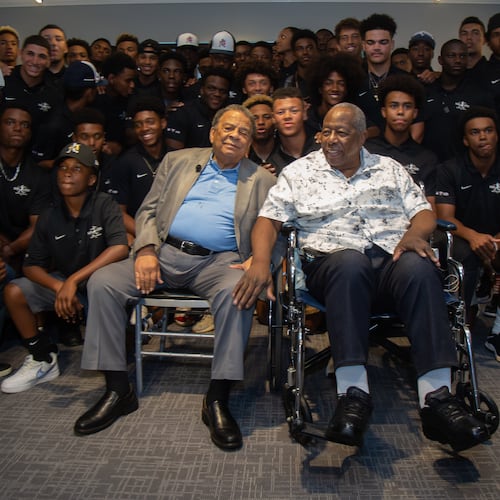The job of any conference commissioner is to tout the strengths of his or her league. ACC commissioner Jim Phillips, for instance, likes to share a talking point that the ACC is third in revenue among the power conferences behind the Big Ten and SEC. It is true, except that it’s a little bit like claiming that jumping is the No. 3 form of human locomotion behind walking and running.
Yes, but sort of.
(Or is it skipping?)
SEC commissioner Greg Sankey rarely has such problems. On a videoconference with media on Thursday prior to the SEC Championship game at Mercedes-Benz Stadium between No. 1 Georgia and No. 8 Alabama, Sankey tossed out this gem. Based on minutes consumed by the public, the SEC was the most-viewed football conference this fall.
No clever framing necessary.
It was part of an answer about the SEC’s plans in moving on from its lucrative partnership with CBS to have first pick of the week’s games to air during its 3:30 p.m. window to an even more lucrative contract with ESPN. (Sankey said that while there will always be a 3:30 p.m. ET game on ABC, the best game of the day might be broadcast during primetime.)
“The broadcast window has become all day from an ABC standpoint,” Sankey said.
It was a reminder, if anyone needed it, of the viewership that the league’s teams command and the revenue it receives as a result.
But on this occasion, Sankey did actually have a little bit of work to do in painting a favorable picture for his league. It regarded the hot topic of the week – could the SEC get squeezed out of the final four-team College Football Playoff?
As you may have read or heard, there exists a good possibility that, should Alabama upset Georgia, that outcome could put the league in position of having no representative in the CFP. Alabama would be 12-1 and a league champion, but there could be three undefeated conference champions by Saturday night – Michigan, Washington and Florida State – and a fourth champion (Texas) that convincingly defeated the Tide head to head in Tuscaloosa in September. Georgia would also be 12-1, but would not have a conference title, a most significant unchecked box. Based on the CFP selection committee’s precedents, that scenario doesn’t look good for the SEC, most consumed minutes or not.
Sankey was asked whether he believed the SEC should have a seat at the table regardless of the outcome of Saturday’s game and if he also thought the CFP selection committee would see it the same way.
“I do,” he said. “I think people would expect me to answer that I do.”
He then went on to present a supporting statistical argument – there are three teams in the latest top 10 with three or more wins over teams in the current top 25 and two of them are Alabama and Georgia. (The third is Washington.)
He also mentioned Georgia distinguishing itself as the two-time defending national champion and that Alabama, with one loss, has continued to improve and win significant games. He wasn’t quite done. He noted the “unparalleled success” of SEC teams in the playoff, which is also accurate.
The problem with his argument is that what a team did last year (or the year before that, for that matter) is not supposed to have sway with the selection committee, nor is conference affiliation. Sankey was using arguments that, while presumably difficult to ignore, are supposed to be, in fact, ignored.
It’d be a little like if a restaurant was being fined for health-code violations and the owner’s defense was “but our hamburgers are delicious.”
Sankey did argue strength of schedule, although he didn’t bring up that Georgia’s strength of schedule is ranked 59th in FBS, according to ESPN’s metrics, behind potential playoff teams Texas (13th), Michigan (36th), Washington (46th) and Florida State (56th). Alabama is 31st.
He also didn’t bring up head-to-head, another key CFP committee factor, as Texas beat Alabama. And, obviously, should Georgia fail against the Tide and jeopardize the SEC’s chances, another factor – common opponents – won’t come to the conference’s aid.
To wit, let’s say the committee wanted to compare a 12-1 Georgia and a 12-1 Texas, the latter the Big 12 champion.
Not only would the Longhorns have a stronger strength of schedule, but they would have beaten the only common opponent they shared with Georgia and done so on the road in convincing fashion while the Bulldogs would have lost to the Tide on a neutral field.
Further, should Texas win Saturday over No. 18 Oklahoma State, the Longhorns would also have three wins over current top-25 teams – the metric that Sankey apparently has decided that the selection committee really ought to consider – and one of them was against, of course, Alabama. The Tide, were they to beat Georgia, would have four top-25 wins (including over the top-ranked team), but the Bulldogs would have three and Texas would have the ultimate tie-breaker of a conference title.
You could make the very easy case that Georgia has the look of a team that ought to be in the playoff regardless of what happens Saturday. The three top-25 wins over Ole Miss, Missouri and Tennessee (by a combined 120-48, no less, in successive weeks) were impressive for anyone who saw them. Meanwhile, Washington’s three top-25 wins were by a combined 89-77.
Total offense and total defense aren’t the preference of the advanced statistics crowd, but they must mean something. There’s only one team in FBS that is ranked in the top 10 in FBS in total offense and total defense and it happens to be Georgia. And does anyone think that, Florida State, particularly without star quarterback and ACC player of the year Jordan Travis (out for the remainder of the season with a leg injury) would be favored to win against Georgia?
And it does feel like the fact that Georgia is the two-time defending national champion ought to matter, and that if the Bulldogs’ only loss is to the No. 8 team in the country, it shouldn’t be that costly a defeat.
But it all may not matter. And, further, those are the rules that Sankey and the SEC agreed to when the committee was formed. What’s more, consider this. If the SEC didn’t have a conference championship game, Georgia would be in. What league started the trend to holding conference championship games (in search of more revenue)? That would be the SEC, of course. (With the 12-team playoff beginning next year, the necessity of the 13th game is coming into question.)
True, it would seem most odd if an SEC-less playoff field is announced on Sunday. The last four CFP champions hailed from the conference where it just means more.
But at least Sankey can take comfort in knowing the playoff field is about to expand and will make room for the six highest-ranked conference champions. Sankey presumably won’t need to campaign then.
About the Author
Keep Reading
The Latest
Featured




